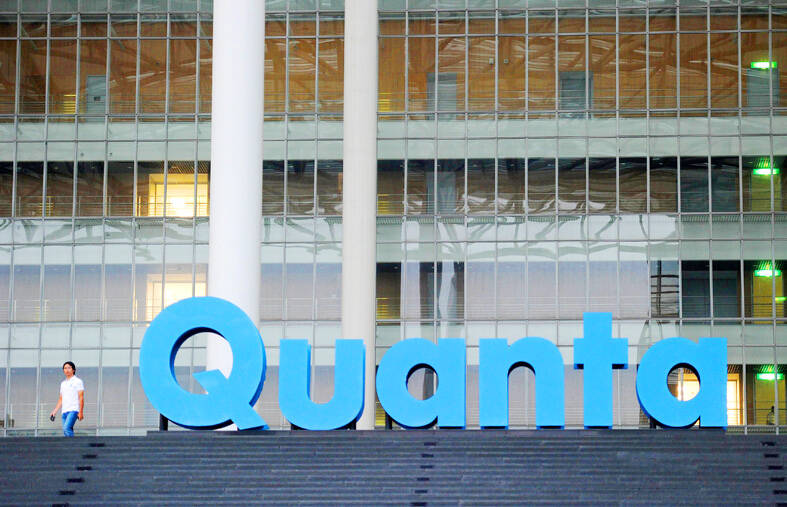Quanta Computer Inc (廣達電腦), one of the world’s leading contract notebook computer makers, yesterday reported that its net profit last month was flat from a year earlier at NT$3.87 billion (US$123.44 million), but totaled nearly 60 percent of the profit it made in the first quarter.
The company earned NT$1 per share last month, while revenue declined 27.1 percent year-on-year to NT$90.18 billion, Quanta said in a filing with the Taiwan Stock Exchange.
In the first quarter, Quanta’s net profit decreased 4 percent year-on-year to NT$6.47 billion, with earnings per share of NT$1.68, while revenue fell 12 percent to NT$266.18 billion, it said.

Photo: Sam Yeh, AFP
Quanta, also a major artificial intelligence (AI) server maker, released its earnings and revenue data at the request of the stock exchange regulator due to an unusual spike in its stock price.
Its shares surged 10 percent to close at NT$248.5 in Taipei trading yesterday, the highest in 23 years.
They have jumped 243.71 percent since the beginning of the year, as investors expect the firm, along with several other local computer hardware makers, to benefit from the increase in AI server adoption by US cloud service providers, such as Microsoft Corp, Amazon.com Inc and Alphabet Inc’s Google.
Yuanta Securities Investment Consulting Co (元大投顧) yesterday forecast that Quanta would secure a share of up to 25 percent of the global AI server market this year, with shipments of 43,000 units.
Shipments next year would likely rise to 99,000 units, Yuanta said in a note, adding that as the average selling price of AI servers is much higher than that of traditional servers, they would significantly contribute to Quanta’s revenue.
Yuanta predicted that Quanta’s AI server sales would grow 139 percent year-on-year to NT$160 billion this year, and increase 129 percent to NT$366.4 billion next year, contributing to 13 percent and 22 percent of the firm’s total sales over the period respectively.
Quanta’s revenue growth would also be driven by its automotive products, such as electronic control units, center consoles, in-vehicle entertainment devices and advanced driver-assistance systems, which have cut into tier-1 supply chains in the US, Europe, and Japan, Yuanta said.
The consultancy estimated that Quanta’s sales in the auto sector would grow 18 percent year-on-year this year and increase 51 percent annually next year.
Given the positive long-term growth outlook for automotive and server demand, Yuanta raised its 12-month target price on Quanta to NT$300, the note said.

CAUTIOUS RECOVERY: While the manufacturing sector returned to growth amid the US-China trade truce, firms remain wary as uncertainty clouds the outlook, the CIER said The local manufacturing sector returned to expansion last month, as the official purchasing managers’ index (PMI) rose 2.1 points to 51.0, driven by a temporary easing in US-China trade tensions, the Chung-Hua Institution for Economic Research (CIER, 中華經濟研究院) said yesterday. The PMI gauges the health of the manufacturing industry, with readings above 50 indicating expansion and those below 50 signaling contraction. “Firms are not as pessimistic as they were in April, but they remain far from optimistic,” CIER president Lien Hsien-ming (連賢明) said at a news conference. The full impact of US tariff decisions is unlikely to become clear until later this month

Popular vape brands such as Geek Bar might get more expensive in the US — if you can find them at all. Shipments of vapes from China to the US ground to a near halt last month from a year ago, official data showed, hit by US President Donald Trump’s tariffs and a crackdown on unauthorized e-cigarettes in the world’s biggest market for smoking alternatives. That includes Geek Bar, a brand of flavored vapes that is not authorized to sell in the US, but which had been widely available due to porous import controls. One retailer, who asked not to be named, because

CHIP DUTIES: TSMC said it voiced its concerns to Washington about tariffs, telling the US commerce department that it wants ‘fair treatment’ to protect its competitiveness Taiwan Semiconductor Manufacturing Co (TSMC, 台積電) yesterday reiterated robust business prospects for this year as strong artificial intelligence (AI) chip demand from Nvidia Corp and other customers would absorb the impacts of US tariffs. “The impact of tariffs would be indirect, as the custom tax is the importers’ responsibility, not the exporters,” TSMC chairman and chief executive officer C.C. Wei (魏哲家) said at the chipmaker’s annual shareholders’ meeting in Hsinchu City. TSMC’s business could be affected if people become reluctant to buy electronics due to inflated prices, Wei said. In addition, the chipmaker has voiced its concern to the US Department of Commerce

STILL LOADED: Last year’s richest person, Quanta Computer Inc chairman Barry Lam, dropped to second place despite an 8 percent increase in his wealth to US$12.6 billion Staff writer, with CNA Daniel Tsai (蔡明忠) and Richard Tsai (蔡明興), the brothers who run Fubon Group (富邦集團), topped the Forbes list of Taiwan’s 50 richest people this year, released on Wednesday in New York. The magazine said that a stronger New Taiwan dollar pushed the combined wealth of Taiwan’s 50 richest people up 13 percent, from US$174 billion to US$197 billion, with 36 of the people on the list seeing their wealth increase. That came as Taiwan’s economy grew 4.6 percent last year, its fastest pace in three years, driven by the strong performance of the semiconductor industry, the magazine said. The Tsai